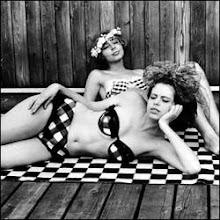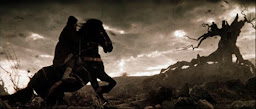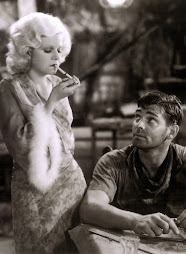
Directed by Guy Maddin of Winnipeg, Manitoba (part of America's Hat, if you were wondering), but more importantly, written by and starring Isabella Rossellini, which means the centenarian "Dad" in this case is Roberto Rossellini, he of Italian Neo-Realism fame. It's a short film that explores Rossellini's "Neo-Realist" philosophy of cinema and compares/contrasts it to the philosophies of Hollywood's Art-for-Entertainment's-sake ethos, Fellini's dream-centered cinema, and even to the great master of silent film himself, the Angelic Tramp, Chaplin. But "My Dad Is 100 Years Old" is also a loving tribute to a father from his daughter. By the end it's hard not to feel one's throat catch in emotional response as daughter tells father just how much she loves and misses him.
Isabella Rossellini shares with her audience deeply personal memories and observations about her father and laments both his death and the seeming death of his ideas about film (i.e.: "Ignorance hasn't been defeated;" today Rossellini's films and philosophy are forgotten). Have Rossellini's ideas been abandoned? Is Isabella Rossellini's film a rebuke to all modern filmmakers, a challenge to return to a cinema that embodies the "need to know," the "quest for knowledge," a cinema of morality and reality that Roberto Rossellini believed in so powerfully?
We learn that Isabella loved her father's large, fat belly, rotund and bulging like a pregnant woman's. She tells how she and her siblings would lay on his large belly in perfect contentment and love, embracing their father as his stomach would rise and fall in the methodical and soothing motions of breathing. We learn that he loved to stay in bed all day and just think and write and work. Isabella compares him to a seahorse because male seahorses are the ones who give birth. She reveals that her father wished he, the man, could have been the one to nurse his children. Father Rossellini, in this case, is a demanding and powerful piece of masculinity, the artist-philosopher, but he's also the soft, spongy, warm and protective belly of happy motherhood. It's quite a contrast to Isabella's mother, who appears later in the film as a projection on the movie screen, an ethereal film goddess, imposing at fifty feet tall, otherworldy, out-of-time and beyond the mere mortal world of fat Italian men's bellies and cigarette ashes next to the typewriter and rumpled bed sheets.
Of course, it's not really Ingrid Bergman in the movie; it's Isabella playing her mother in all her Casablanca-esque glory. In fact, Isabella plays all the characters in the movie (she even does the voice of her father, though he's represented visually in the film by a giant talking fat belly, provided courtesy of Isaac Paz Sr.'s big ol' gut). Isabella is Ingrid Bergman, Alfred Hitchcock, David O. Selznick, Fellini, and even Chaplin. In addition to writing a witty and wonderful script, she's also fabulous as each in this motley crew of cinema greats.
And Maddin's style is all delightful cinema tricks and enchantments. Shot in black and white, he gives us the great characters of cinema's past not as talking heads or members of a roundtable discussion. Instead he gives them to us as we remember, as creatures of the screen. We meet Hitchcock as a silhouette straight out of "Alfred Hitchcock Presents;" Chaplin is as silent as one of his films and speaks only in title cards; and Ingrid Bergman, mega-movie star that she is, appears only on a giant movie screen. For a film about the great Neo-Realist director, Roberto Rossellini, Guy Maddin seems to be copying the carnivalesque spirit of Fellini. It's a fascinating dichotomy.
"My dad was a genius. Maybe."
I wish I knew more about Rossellini's films and his filmmaking philosophy. I know the standard Intro to World Cinema stuff about Italian Neo-Realism, but I've only seen a few clips of "Rome, Open City" and I've never read anything about Rossellini's philosophy specifically. Watching "Dad" has made me want to find out more (luckily, in my collection of movies on DVD, there are a few Rossellinis mixed in, so I should be finding out more about the man and his films in short order).
"My Dad Is 100 Years Old" is fascinating not only because we witness the touching heartbreak of a daughter calling out to her father across time and celluloid. It's fascinating not only because of the paradox between subject matter and style, of Rossellini's realism versus Maddin's madcap fantasy. It's fascinating because Rossellini's belief in the power and responsibility of cinema is a challenge to the viewers as well as the filmmakers of the world. What do we expect from our cinema? What do we demand from our filmmakers? What do filmmakers believe in when they set their camera down and start shooting? Does the filmmaker have a moral responsibility to show life as it is, to educate his audience, to bring knowledge about humanity's struggles to the world? Does a cinema of dreams, or a cinema of fun, or a cinema of pleasure distract from the troubles of the world, from the lives of people struggling to be human, which is, afterall, the proper subject for an art that seeks to be moral? Is there a place in cinema for both entertainment and morality?
Hitchcock gets off the best line in the film: "Morality? Roberto, you should have been a priest."
In the end, we get a glimpse into the mind of both Rossellinis, father and daughter, and we learn that if nothing else, cinema can be an expression of love. The love Isabella Rossellini has for her father is what lingers after the credits have rolled, it's what stays and gives the film its ultimate power, and that is a cinematic philosophy I can believe in.












_01.jpg)







No comments:
Post a Comment